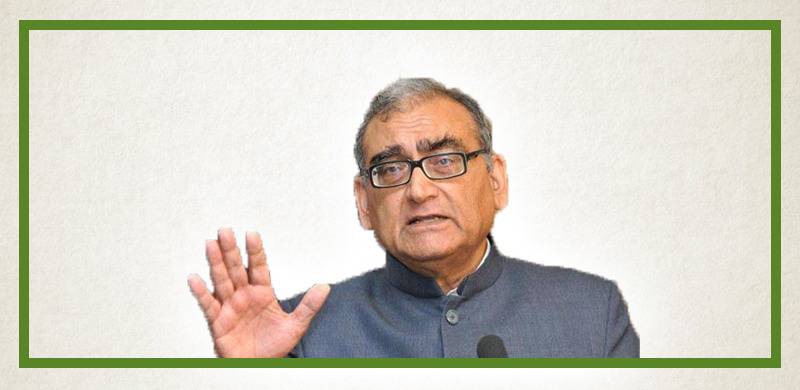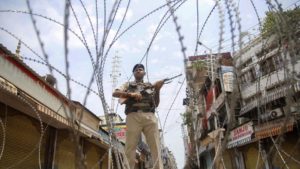
Former judge of the Supreme Court of India, Justice Markandey Katju, writes about the recent speech of Indian journalist Aarti Singh, in which she blamed the situation in Kashmir on Pakistan. He refutes Aarti’s criticisms on the Pakistani state, and argues that India, through its decisions over the decades, has created the situation that currently prevails in Kashmir.
Indian journalist Aarti Tikoo Singh was surely economical with the truth when she recently spoke before the United States Congress on Human Rights in South Asia. Singh has put the entire blame for the situation in Kashmir on Pakistan and its agents. For this, she has received fulsome praise and plaudits in India. I regret to have the unenviable task of pouring cold water on all this bonhomie and hoopla.
A reading of Aarti Singh’s speech indicates that she believes the villain in Kashmir to be Pakistan alone and Pakistani-inspired terrorism and that Kashmiri people were with India and they wished to remain with India. Her speech also shows that she believes the abrogation of Articles 35A and 370 to be of benefit to Kashmiris.
I do agree that for long, Pakistan was supporting terrorism in Kashmir. I also condemn what was done to Kashmiri pandits, who were hounded out of the valley. But to believe that Pakistan alone was responsible for the present situation in Kashmir was misleading, fallacious and a gross oversimplification.
What Aarti conveniently overlooks is that due to the continuous stupidity of the Indian governments over the decades, the situation today is that almost the entire Kashmiri populace has been totally alienated and is bitterly hostile to India. Aarti totally ignored this fact in her speech, and that is why it was disingenuous.
Aarti blames Lashkar-e-Taiba for the murder of Shujaat Bukhaari, a Kashmiri journalist. But what proof does she have that Lashkar-e-Taiba was responsible for the murder? She also blames Jaish-e-Muhammad, again, without proof. She has sought to create an impression that but for Pakistan, Kashmiris are hunky dory, cozy and gemutlich with India. This is false. The truth is that almost all Kashmiris, except Pandits, hate India.
About the abrogation of Articles 35A and 370, Aarti praises it. However, my own opinion is that it was a gimmick – like Yoga Day, building of Ram Mandir, cow protection, Swatchata Abhiyan, etc – by a beleaguered government to divert attention away from the terrible economic crisis looming before India, about which the government has no solution.
Moreover, to say that businessmen would now be buying land in Kashmir and would set up factories is naive. Businessmen are not fools, and they will never set up factories in an area with instability where bullets may be flying around.
Aarti was utterly mendacious when she said that the abrogation of Article 370 would provide Kashmiris with equal protection under the law and all the rights that other Indian citizens enjoy regardless of their gender, sexual orientation, religion or social class. She also spoke of how it would give Kashmiris access to educational and economic opportunities. Here, she is clearly toeing the Indian government’s line.
Aarti does refer to the inconvenience caused by the restrictions imposed in Kashmir after the abrogation of Article 370. But I would like to put forth a question for her: will she not feel miserable if deprived of mobile and Internet facilities for even one day? Today, internet and mobiles are not luxuries, but necessities. After 72 days, post-paid mobile services were restored, but Internet remains banned to this day in Kashmir. Meanwhile, curfews are still in force in many areas.

The internet ban has created huge difficulties for Kashmiris. Many forms could be filled online without a hassle, but now Kashmiris often have to travel 20 kilometres or more for doing so. The same goes for flight and train reservations. Emails could also be sent using the internet, but not if the facility is unavailable.
These restrictions, apart from the curfews, have made the lives of Kashmiris more miserable. The arrest of hundreds of Kashmiri leaders has blocked any space for democratic dissent. Will this not drive more Kashmiris to militancy?
I regret to say that Aarti Tikoo Singh has acted more as an agent of the government of India rather than as an objective, neutral and impartial journalist in her address to the US Congress.
Indian journalist Aarti Tikoo Singh was surely economical with the truth when she recently spoke before the United States Congress on Human Rights in South Asia. Singh has put the entire blame for the situation in Kashmir on Pakistan and its agents. For this, she has received fulsome praise and plaudits in India. I regret to have the unenviable task of pouring cold water on all this bonhomie and hoopla.
A reading of Aarti Singh’s speech indicates that she believes the villain in Kashmir to be Pakistan alone and Pakistani-inspired terrorism and that Kashmiri people were with India and they wished to remain with India. Her speech also shows that she believes the abrogation of Articles 35A and 370 to be of benefit to Kashmiris.
I do agree that for long, Pakistan was supporting terrorism in Kashmir. I also condemn what was done to Kashmiri pandits, who were hounded out of the valley. But to believe that Pakistan alone was responsible for the present situation in Kashmir was misleading, fallacious and a gross oversimplification.
What Aarti conveniently overlooks is that due to the continuous stupidity of the Indian governments over the decades, the situation today is that almost the entire Kashmiri populace has been totally alienated and is bitterly hostile to India. Aarti totally ignored this fact in her speech, and that is why it was disingenuous.
Aarti blames Lashkar-e-Taiba for the murder of Shujaat Bukhaari, a Kashmiri journalist. But what proof does she have that Lashkar-e-Taiba was responsible for the murder? She also blames Jaish-e-Muhammad, again, without proof. She has sought to create an impression that but for Pakistan, Kashmiris are hunky dory, cozy and gemutlich with India. This is false. The truth is that almost all Kashmiris, except Pandits, hate India.
About the abrogation of Articles 35A and 370, Aarti praises it. However, my own opinion is that it was a gimmick – like Yoga Day, building of Ram Mandir, cow protection, Swatchata Abhiyan, etc – by a beleaguered government to divert attention away from the terrible economic crisis looming before India, about which the government has no solution.
Moreover, to say that businessmen would now be buying land in Kashmir and would set up factories is naive. Businessmen are not fools, and they will never set up factories in an area with instability where bullets may be flying around.
Aarti was utterly mendacious when she said that the abrogation of Article 370 would provide Kashmiris with equal protection under the law and all the rights that other Indian citizens enjoy regardless of their gender, sexual orientation, religion or social class. She also spoke of how it would give Kashmiris access to educational and economic opportunities. Here, she is clearly toeing the Indian government’s line.
Aarti does refer to the inconvenience caused by the restrictions imposed in Kashmir after the abrogation of Article 370. But I would like to put forth a question for her: will she not feel miserable if deprived of mobile and Internet facilities for even one day? Today, internet and mobiles are not luxuries, but necessities. After 72 days, post-paid mobile services were restored, but Internet remains banned to this day in Kashmir. Meanwhile, curfews are still in force in many areas.

The internet ban has created huge difficulties for Kashmiris. Many forms could be filled online without a hassle, but now Kashmiris often have to travel 20 kilometres or more for doing so. The same goes for flight and train reservations. Emails could also be sent using the internet, but not if the facility is unavailable.
These restrictions, apart from the curfews, have made the lives of Kashmiris more miserable. The arrest of hundreds of Kashmiri leaders has blocked any space for democratic dissent. Will this not drive more Kashmiris to militancy?
I regret to say that Aarti Tikoo Singh has acted more as an agent of the government of India rather than as an objective, neutral and impartial journalist in her address to the US Congress.
